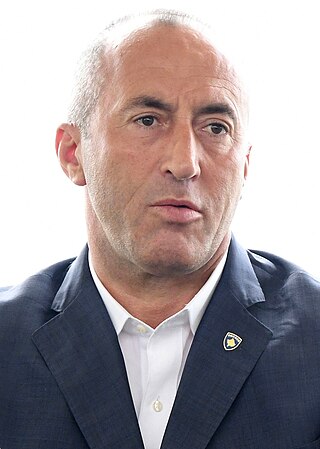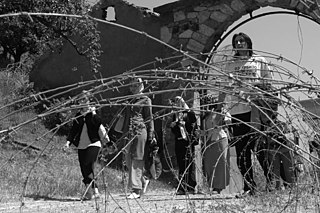
The United Nations Interim Administration Mission in Kosovo is the officially mandated mission of the United Nations in Kosovo. The UNMIK describes its mandate as being to "help the United Nations Security Council achieve an overall objective, namely, to ensure conditions for a peaceful and normal life for all inhabitants of Kosovo and advance regional stability in the Western Balkans."

The Kosovo Force (KFOR) is a NATO-led international peacekeeping force and military of Kosovo. KFOR is the third security responder, after the Kosovo Police and the EU Rule of Law (EULEX) mission, respectively, with whom NATO peacekeeping forces work in close coordination. Its operations are gradually reducing until the Kosovo Security Force, established in 2009, becomes self-sufficient.

The Kosovo Police is the national policing law enforcement agency of Kosovo. It was established in 1999 and took its current form with the 2008 police law. It consists of five departments and eight regional directorates and is represented at the political level by the Ministry of Internal Affairs and Public Administration of the Republic of Kosovo.
The politics of Kosovo takes place in a framework of a multi-party parliamentary representative democratic republic, whereby the President (Presidenti) is the head of state and the Prime Minister (Kryeministri) the head of government. Parliamentary elections are held every four years, the most recent in 2021.

Ramush Haradinaj is a Kosovo Albanian politician, leader of the AAK party, and the third prime minister of Kosovo. He is a former officer and leader of the Kosovo Liberation Army (KLA), and previously served as Prime Minister of Kosovo between 2004 and 2005.

The Kosovo Protection Corps was a civilian emergency services organization in Kosovo active from 1999 until 2009.

Vetëvendosje is a left-leaning social democratic political party in Kosovo. It is a member of the Progressive Alliance, and an observer in the Party of European Socialists, and the Socialist International.

United Nations Security Council resolution 1244, adopted on 10 June 1999, after recalling resolutions 1160 (1998), 1199 (1998), 1203 (1998) and 1239 (1999), authorised an international civil and military presence in the Federal Republic of Yugoslavia and established the United Nations Interim Administration Mission in Kosovo (UNMIK). It followed an agreement by Yugoslav President Slobodan Milošević to terms proposed by President of Finland Martti Ahtisaari and former Prime Minister of Russia Viktor Chernomyrdin on 8 June, involving withdrawal of all Yugoslav state forces from Kosovo.

On 17–18 March 2004, violence erupted in Kosovo, leaving hundreds wounded and at least 19 people dead. The unrest was precipitated by unsubstantiated reports in the Kosovo Albanian media which claimed that three Kosovo Albanian boys had drowned after being chased into the Ibar River by a group of Kosovo Serbs. UN peacekeepers and NATO troops scrambled to contain a gun battle between Serbs and Albanians in the partitioned town of Mitrovica, Kosovo before the violence spread to other parts of Kosovo. Kosovo Serb communities and cultural heritage were attacked by crowds of Albanians. Serbs call the event the March Pogrom, while the Albanians call it the March Unrest.
Kosovo during the 20th century in history has largely been characterised by wars and major population displacements. The region formed a part of numerous entities, some internationally recognised, others not.
The political status of Kosovo, also known as the Kosovo question, is the subject of a long-running political and territorial dispute between the Serbian government and the Government of Kosovo, stemming from the breakup of Yugoslavia (1991–92) and the ensuing Kosovo War (1998–99). In 1999, the administration of the Autonomous Province of Kosovo and Metohija was handed on an interim basis to the United Nations under the terms of UNSCR 1244 which ended the Kosovo conflict of that year. That resolution reaffirmed the territorial integrity of Serbia over Kosovo but required the UN administration to promote the establishment of 'substantial autonomy and self-government' for Kosovo pending a 'final settlement' for negotiation between the parties.

The Constitution of Kosovo is the supreme law of the Republic of Kosovo, a territory of unresolved political status. Article four of the constitution establishes the rules and separate powers of the three branches of the government. The unicameral Assembly of the Republic exercises the legislative power, the executive branch led by the President and the Prime Minister which are responsible for implementing laws and the judicial system headed by the Supreme Court.

The flag of the Republic of Kosovo was adopted by the Assembly of the Republic of Kosovo immediately following the unilateral declaration of independence of Kosovo on 17 February 2008. The flag design emerged from an international competition, organized by an informal group from the Provisional Institutions of Self-Government known as the Kosovo Unity Team, which attracted almost one thousand entries. The winning design was proposed by Muhamer Ibrahimi. It shows six white stars in an arc above a golden map of Kosovo, all on a blue field. The stars symbolize Kosovo's six major ethnic groups: Albanians, Serbs, Bosniaks, Turks, Romani, and Gorani.
The 2008 Kosovo declaration of independence, which proclaimed the Republic of Kosovo to be an independent and sovereign state, was adopted at a meeting held on 17 February 2008 by 109 out of the 120 members of the Assembly of Kosovo, including the Prime Minister of Kosovo, Hashim Thaçi, and by the President of Kosovo, Fatmir Sejdiu. It was the second declaration of independence by Kosovo's Albanian-majority political institutions; the first was proclaimed on 7 September 1990.

The 2008 unrest in Kosovo followed Kosovo's declaration of independence on February 17, 2008. Some Kosovo Serbs opposed to secession boycotted the move by refusing to follow orders from the central government in Pristina and attempted to seize infrastructure and border posts in Serb-populated regions. There were also sporadic instances of violence against international institutions and governmental institutions, predominantly in North Kosovo.
The Ahtisaari Plan, formally the Comprehensive Proposal for the Kosovo Status Settlement (CSP), is a status settlement proposed by former President of Finland Martti Ahtisaari covering a wide range of issues related to the status of Kosovo.

The Cathedral church of Christ the Saviour in Pristina, Kosovo is an unfinished Serbian Orthodox Christian church whose construction began in 1992. Due to have been completed in 1999, its construction, on the campus of the pre-war University of Pristina, was interrupted by the Kosovo War.

Kosovo has a civil law system which is also sometimes known as the Continental European law system. The central source of law that is recognized as authoritative is codifications in a constitution or statute passed by legislature, to amend a code. This system of Kosovo has experienced several changes throughout the years and is currently a system that includes prominent bodies and branches that help Kosovo enact adequate laws and conduct proper legal procedures.

The 2000 unrest in Kosovo was the result of the United Nations Interim Administration adopting Resolution 1244 on 10 June 1999. The unrest was fought between the Kosovo Force (KFOR), Kosovar Albanians, and Kosovar Serbs. It lasted somewhere from February 16, 2000 – June 6, 2000. An unknown number of Kosovar Albanians and Kosovar Serbs died along with an unknown number injured, while 1 Russian KFOR soldier died from shot wounds and UNMIK vehicles were burned during the unrest.

United Nations Administered Kosovo refers to the period between 1999 and 2008 when the United Nations Interim Administration Mission in Kosovo was directly responsible for the governance of Kosovo. This period began on 10 June 1999 with the passing of United Nations Security Council Resolution 1244 and effectively ended on 17 February 2008 with the unilateral declaration of independence of Kosovo.













